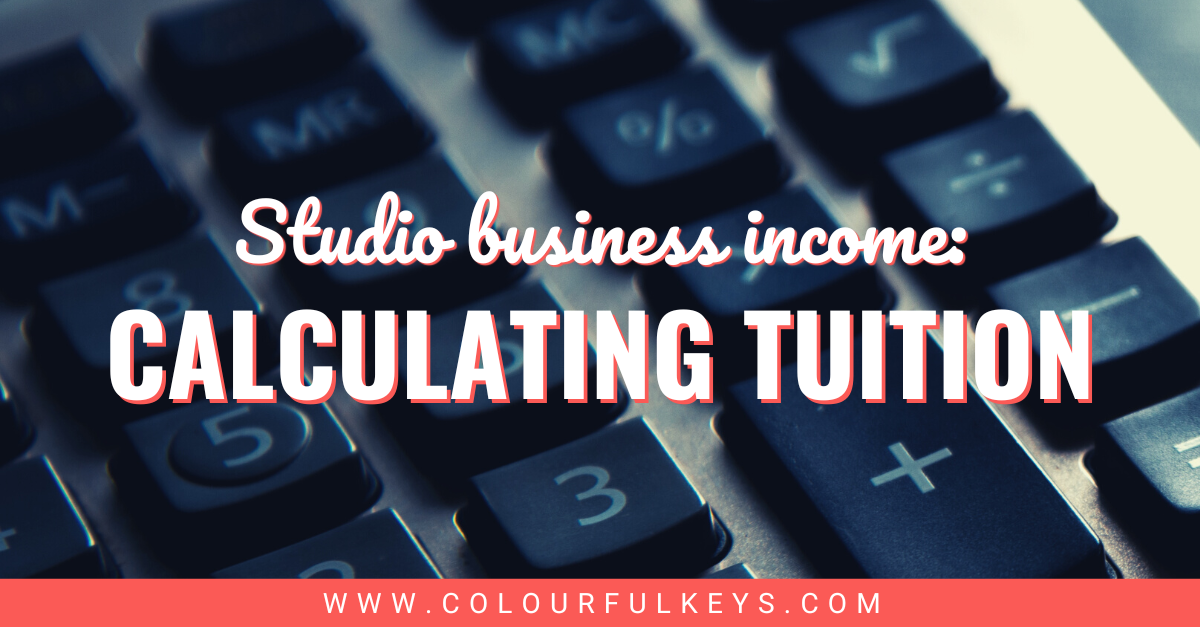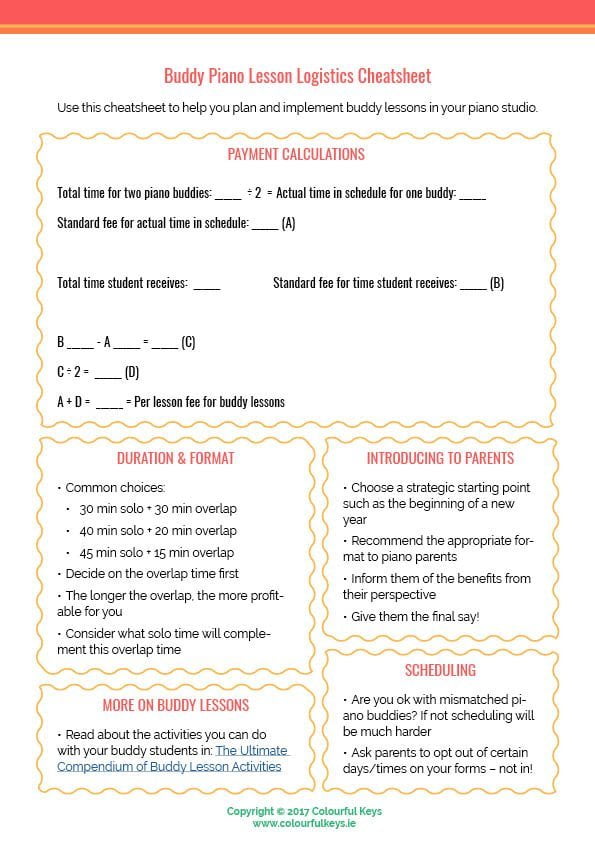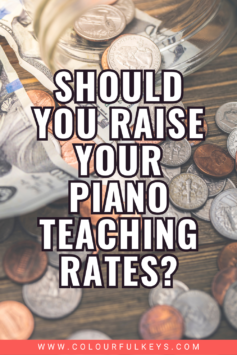
This article about whether or not to increase your piano teaching rates was written by Joanna Shiel. Joanna is a piano teacher and the editorial assistant for Vibrant Music Teaching. She’s been running her private studio teaching business for over 14 years, and now teaches exclusively online while travelling full-time. Her dessert of the month is honey-glazed peaches with greek yoghurt.
Are you feeling the pinch of inflation? Do you need to increase your rates, but are worried about passing on the costs to already struggling families?
Don’t worry, you’re not alone.

We’d all like to have more money. But many teachers fear that raising tuition will alienate families and compel them to find a “cheaper” teacher elsewhere. (Or worse yet, give up lessons altogether.)
Ask yourself these 8 yes-or-no questions to decide if charging more truly is the right direction for your teaching business.
No. 1: Do you struggle to make ends meet in your personal and business life?
If you answered “yes”, and your studio is at least 80% full, you might want to increase your piano teaching rates.
If you answered “no”, you’re probably charging enough.
Have a lot of openings in your schedule this year? I suggest filling them before evaluating your current tuition rates. Try these 11 awesome ideas for marketing your studio and getting more students.
Living Paycheck-to-Paycheck
If that concept resonates, this should be a glaring red warning sign that you need more income.
Suppose you’re a teacher pinching pennies to get by. Not earning enough will have a knock-on effect in every area of your studio,
Fair-to-middling income will:
- Affect how you feel about the piano teaching profession
- Keep you from purchasing new music
- Cause you to forgo investing in professional development
Is that what your students deserve?
No. 2: Are you able to put money aside for your pension and savings goals?
If you answered “yes”, well done! Your tuition is probably right where it should be.
If you answered “no” (or laughed sarcastically at the mere thought of a pension), and piano teaching is your sole source of income, raise your rates.
Teaching piano is not a retirement plan.
It’s a job. Work. A career.
It’s one thing to reach retirement (at whatever age and stage that looks like) and then decide to take on students simply because you love teaching.
It’s another thing entirely to pile pressure on your future self to carry on working when you might want a different pace of life.
If you’re not earning enough to squirrel something away each month, you’re not making the most of compound interest, and you’re doing yourself a disservice.
Need more money-management help? Colourful Keys has devoted an entire page to everything you need to know to manage your music teaching studio business.
No. 3: Have people been ignoring or taking advantage of your policies?
If you answered “yes”, then these folks don’t see your value or take you seriously as a businessperson. Increasing your rates might make them scurry – which is not necessarily a bad thing.
If you answered “no”, then your rates may be high enough already to dissuade those families who don’t value your worth.
People Pay for What They Value
Isn’t it funny how the lower your rates are, the more administrative issues you’re likely to have with students – and, even more so, their parents?
These are generally the folks who ask for make-up lessons when they forgot to show up or decided on a last-minute getaway. They tend to pay their tuition late, not to mention show up late for lessons.

If you’re finding families are constantly testing your policy’s boundaries, you may just need a better-quality client that understands the benefits behind a higher fee.
Remember: The people who left because they decided you’re “too expensive” have simply made space in your schedule for higher-calibre clientele.
Increase Your Value
If you need to attract more discerning piano families, look into “value-added” offerings like periodic group lessons and piano parties to justify a tuition increase.
You could also create new revenue streams with clubs, workshops or camps for outside students.
If you’re teaching one-on-one lessons, then transitioning to a buddy-lesson format is a good way to add value and justify a tuition increase. Enter your info below and I’ll send you a cheatsheet to help you with the logistics of buddy lessons.

Subscribe to updates and get the Buddy Lesson Logisitics Cheatsheet
Enter your details to subscribe to the newsletter for piano teachers with information, tips and offers.
I hate spam as much as you do! I’ll only send you information that’s directly relevant to music teachers and you can unsubscribe at any time.
If you’re a member of the Vibrant Music Teaching family, you can download the logistics cheatsheet from the Printable Library (along with many other resources to help you implement buddy lessons). To learn more about the membership, take a tour today.
Rate Calculators
Figuring out what to charge for lessons can be daunting, so we’ve created a tool to help you navigate all the numbers. Simply hop over to our rates calculators, choose which one is right for you and enter your info. We’ll do the maths for you! 🙂
No. 4: Are you the lowest-rate teacher in your area?
If the answer is “yes”, you should give yourself a raise – increase your piano teaching rates for the next studio year.
If the answer is “no”, then at least make sure your rates are above the median range in your area.
Being the “Bargain” Teacher Serves Nobody
Charging low rates might seem like the best option when you’re starting out as a new, inexperienced teacher, but this would be unwise.
Not only will you be attracting “bottom-of-the-barrel” parents (see No. 3) but you’ll be lowering the value of piano teaching as a profession overall.

If you’re new to a teaching career, you can absolutely command a fair rate right out of the gate. Feel free to set, and earn, an income that will make you feel secure.
If you’re an experienced teacher, consider these factors:
- Years of training you’ve taken to be a musician and teacher
- Money you have to set aside for taxes
- Books and materials you need to purchase
- Time, effort and money invested in professional development
Often people looking for the cheapest deal for a service don’t appreciate all the factors that go into a service demanding a fair fee.
No. 5: Do you have a waiting list?
If you answered “yes”, it means you’re an in-demand teacher with ample grounds to raise your rates.
If you answered “no”, your rates might be OK, but you may want to refresh your teaching style to reach more students and increase your income.
Waiting List Wonderings…
Everyone has different ideas about how to handle the ‘ol waiting list in their studios, and how that might affect their income. Consider these reflections.
Refer them Out
I have a bit of a controversial take. If you’re attracting more students than you can handle, I believe it makes little sense to keep them on a long waiting list, twiddling their thumbs for months before you have room in your schedule.
Why not allow them to go forth and learn piano with another teacher? Won’t that better serve the cause of music education in general?
Who’s next?
It’s true that when you have a waiting list, you can more easily justify raising rates.
If a parent questions a tuition hike and consequently “takes a hike”, you can always call the next-in-line student. And the student who’s been expectantly waiting to join your studio will presumably pay whatever they must to get in.
Freshen Up
If you don’t have people chomping at the bit to take lessons from you, don’t fret. It doesn’t necessarily mean your rates are too high.
But it could mean that you need to reinvigorate your teaching.
Take the “free” time in your schedule to pursue professional development, improve your marketing and make use of the VMT Library to keep your teaching fresh and fun. You’ll be an “in-demand” teacher in no time, with a solid basis to increase your piano teaching rates.
No. 6: Have you been raising your rates yearly to match inflation?
If the answer is “yes”, then your relative income has been the same year-to-year, and you might have room to give yourself a pay raise.

If the answer is “no”, you’re losing money each year that passes, and you should raise your rates and continue to raise them each year.
Don’t Take a Pay Cut
If you’re not matching inflation year-on-year, then your purchasing power is less and you’re effectively giving yourself a pay cut every year.
What usually happens (and yes, I’m totally talking to myself here) is that a time comes when you realise your fees are just too low and you have to increase them by a huge chunk.
Getting into the habit of raising tuition by 3% or so yearly is much more palatable to families than hiking it up by 15% every few years.
No. 7: Do about 20% of prospective students question your rates?
If the answer is “yes”, your tuition may be high enough.
If the answer is “no”, your piano teaching rates are likely too low, and there’s probably room to increase them.
Remember: You’re worth it!
Compared to similarly skilled professions, piano teachers are chronically underpaid.
In general, we’re a pretty modest bunch. When a parent questions your fee, it usually doesn’t mean you’re price gouging – it could be that they just don’t see the value of your services, or they’re used to questioning everything in general.
Stay strong.💪
In my book, you’re doing it right if around 20% of prospective students opt to go elsewhere because they believe your fees are too high.
No. 8: Are you charging at least as much as your local association’s minimum suggested fee?
If you answered “yes”, and you’re somewhat above the minimum, then your rates are probably about right. But if you’re close to the minimum, consider factors like your expertise and experience to decide if you could charge more.
If you answered “no”, then you certainly need to increase your piano teaching rates.
Take a Look Around
It’s important to keep on top of the average piano teaching rates around the globe, as well as the country you live in and your local area. Explore the latest Vibrant Music Teaching Industry Report to find out how you compare.
If you’re a member of your local music teachers’ association, this is a fantastic place to find out what your area’s teachers are charging.
My local MTA takes into account all the things you need to work as a self-employed teacher, plus what the local market can bear, and wraps it all up into a recommended start rate.

Are you charging enough in your piano teaching business?
I’d love to hear your thoughts in the comments below.
I have an 18 year old student who has been with me for 10 years (up to Grade 8) and is now taking on pupils of her own……..although this is wonderful, her rates are nearly in line with mine, and I have 40 years experience! Kinda sticks in the throats a bit…..
Have you been raising your rates regularly, Karen? Sounds like you may need to bump them up quite a bit!